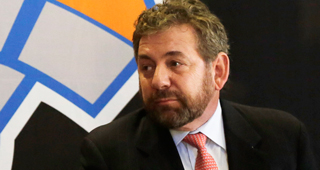With the White House’s strange, carnivalesque gyrations comes a reconsideration of American power. The NBA, as sports never are, is not immune to the pressures of this politically fraught moment—Rich DeVos, owner of the Orlando Magic, is father-in-law to and funder of our controversial new Secretary of Education, Betsy DeVos, after all. But it’s one of the league’s more attended to franchises that’s exhibiting peak levels of dysfunction as the new presidential administration does the same. The New York Knicks, above all contenders, have painted a picture of authoritarian company farce in recent weeks, alienating both their fanbase and former team greats as they fare no better on the court, stumbling below playoff contention in the paltry Eastern Conference.
February’s soap opera featuring Knicks owner James Dolan and force-first power forward Charles Oakley, a beloved Madison Square Garden icon from the halcyon grit-first Knicks teams of the 90’s, is history by now. Oakley, attending the game on his own dime, said something inflammatory—and likely true—to the reviled billionaire owner and was then flanked by security guards, kicked out of the arena, and accused of having a drinking problem that multiple nearby reporters saw no evidence of. The subsequent indefinite ban of Oakley from the arena (since revoked, following massively negative blowback) leaned on strange fiction and a version of order that makes little, if any, distinction between being right and being in power.
This incident, eerily reflective of new narratives of national border control in the news, saw the top of the organization insisting to its disagreeing audience that a man they love is in fact an agent of danger and chaos. When the Knicks played the San Antonio Spurs at home in a nationally televised game, the following Sunday afternoon, Dolan scrambled in an effort to make up for this folly, recruiting as many former Knicks standouts as he could to fill his seats and make him look benevolent. "[Dolan] called me sounding really sad asking me if I would come sit with him. [I] hadn't spoken to him in 15 years,” said former Knick Vin Baker. In one of the odder moments of NBA theater within contemporary memory, Latrell Sprewell, Larry Johnson, Bernard King and other former Knicks ended up attending the game and sitting with Dolan in the front row, stagily smiling for the network cameras.
This discomfiting sight has left many with a more transparent sense of league ownership than they’re used to. Awareness of highly flawed management is spreading beyond the perpetually frustrated bleachers of MSG, though, with similarly frustrated fans of the Chicago Bulls set to make another ABC weekend broadcast into a symposium on the power structure of the sport. In anticipation of the Bulls’ March 4 home game against the Los Angeles Clippers, aggrieved fans are looking to mobilize inside the United Center and call for the dismissal of front office executives Gar Forman and John Paxson. A growing group intends to wear layers over “FIRE GAR PAX” t-shirts that they will reveal at some point during the broadcast.
The tension between the Bulls and their city owes to a mediocrity resulting from two years of bad decisions known to be bad, as they were made, by the fanbase. The beginning of these was the emotional firing of Tom Thibodeau, done by way of a press release that—while surely better worded—was shot through with a sass not dissimilar to what we see in Donald Trump’s tweets. Going well beyond the anodyne, boilerplate norm of such documents, this release contained the phrase “invasion of turf” and painted a detailed, dubious picture of the organization (calm, holistic, sharing) as a foil to his pesky behavior; Thibodeau is the second most successful head coach in Bulls history. And while grassroots activism is perhaps an undue response to poor basketball management, what’s telling in Chicago is the way that new populist political momentum is seeping through the walls of sports.
Superstars, too, are feeling freer to express the strain between labor and management in the NBA, a topic often left to the corridors of wonky, rarely read bloggers. Draymond Green called Dolan’s handling of the Oakley situation an ailment of a “slave master mentality” on his podcast. "It was all fine and dandy when he was laying people out, taking fines and all this stuff for your organization,” Green said of Oakley. “But now, all of a sudden, when he says something that he feels, it's a problem.” In a recent interview, Green’s teammate Kevin Durant said that in the basketball world, “we’re stuck in this bubble… we worry about stuff that really doesn’t matter.” As the NBA reacts to an increasingly chaotic society outside that bubble, though, and pushes back on the forms that cultural madness takes within its own world, it plays a relevant role in the ongoing American identity crisis.



